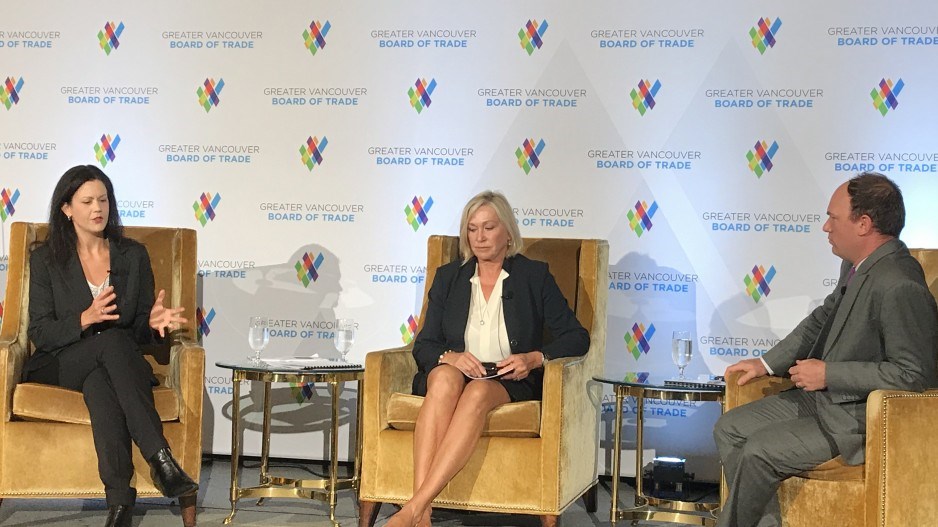A promise to scrap the national carbon tax may resonate in other parts of Canada, but it appears to be a non-issue in Metro Vancouver, according to a survey of both ordinary voters and business done for the Greater Vancouver Board of Trade (GVBOT) on federal election issues.
Ironically, perhaps, the same might be said for the Trans Mountain pipeline expansion.
The top concern for ordinary voters is the environment, according to the survey by the Mustel Group, FleishmanHillard High Road and GVBOT, followed by the economy and affordability, in that order.
Carbon taxes ranked dead last on a list of issues of concerns, both for businesses and the general population in Metro Vancouver.
Even so, Ed Fast, Conservative MP for Abbotsford, reiterated the Conservative plan to scrap the national carbon tax, when given seven minutes to hit the main points of his party’s platform during discussion on the new survey Monday, September 16.
He was one of four candidates from the Liberals, Conservatives, NDP and Greens in the Metro Vancouver region invited to speak to the survey at a discussion hoted by GVBOT.
Likewise, one of the priorities listed by Jesse Brown, Green Party candidate for Vancouver Centre, was scrapping the Trans Mountain pipeline expansion, even though it doesn’t appear to be top of mind for most voters.
Pipelines ranked only 8% among ordinary voters, in terms of top election priorities, and 7% for business.
“The list is quite long, but further down the list is things like ‘pipeline,’ actually only mentioned by 3% of residents,” said Evi Mustel, principal for the Mustel Group. “So not a key issue in the election. It certainty is driving the conversation around the environment, but on itself it’s a not key issue.
“We didn’t hear very much about SNC Lavalin, which is hotly being discussed in other regions of the country,” Mustel added. “Immigration – not a big topic here, either.”
Among ordinary Metro Vancouver residents, 49% identified the environment as the top election issue, with climate change being a subset at 29%.
Of businesses polled, 45% ranked the economy as the top concern, with environment at 37%. The survey was based on a polling of 200 Metro Vancouver businesses and 600 Metro Vancouver residents.
“I think what we’re seeing is really the environment really eclipsing a lot of other issues in terms of what’s top of mind for people in a much bigger way than we’ve seen before,” said Anna Lilly, a partner at FleishmanHillard.
Despite climate change being such a top concern for voters, the survey shows most residents want a “balanced approach” to dealing with climate change and developing Canada’s natural resources. The federal government should continue to develop oil and gas sectors, while investing in strategies to transition to alternative renewable energy, said 53% of ordinary residents and 69% of business respondents.
On the question of meeting Canada’s greenhouse gas reduction targets, the Greens and NDP have been playing a game of one-upmanship with the Liberals and Conservatives, both of whom have a target of 30% below 2005 levels by 2030. The NDP’s target is a 50% reduction, the Greens 60%.
While the Conservatives have committed to a 30% GHG reduction by 2030, it appears much of the GHG reductions it hopes to achieve would come outside of Canada, through the export of Canadian clean technology and low-carbon products.
The Conservative Party’s plan for dealing with climate change is focused on “incenting and accelerating the development of clean technology,” Fast said. He said climate change is a global problem that requires “a global response.”
“Canada’s perfectly positioned to deliver that response by displacing dirtier products from elsewhere with cleaner products from Canada, like natural gas and aluminum,” he said. “We also believe that Canadian technologies like carbon capture and storage, and air-to-fuel technology represent ground-breaking innovations that can help polluting countries like China and India significantly improve their environmental performance.”
One thing business and ordinary citizens share as a top concern is affordability. It was the third top concern among both groups of respondents. The survey found 41% of Metro Vancouver residents saying they are considering moving out of the Metro Vancouver region, due to affordability issues. Businesses expressed serious concerns about being able to attract and retain workers, due to affordability.
Jonathan Wilkinson, Liberal incumbent for North Vancouver, said the concerns over affordability in Metro Vancouver is primarily about housing costs.
“In the rental area, we have brought into place a $50 billion national housing strategy,” he said. “It’s the first time in decades the federal government has been involved in the housing area.”
Part of that funding is the national co-investment fund, which is designed to create 60,000 new rental housing units across Canada, and repair 240,000 existing units.
"Unfortunately the Liberal government's national housing strategy does not address our immediate core housing needs across Canada," Brown said, adding it rolls out over 15 years.
The Green Party is committing to increasing the national co-investment fund by $750 million for new builds, and another $750 million for rental assistance for 125,000 households, a national co-op housing financing strategy, and allocating of 1% of the GST revenue to housing and municipal infrastructure.
Peter Julian, NDP MP for New Westminster-Burnaby, said the NDP plan for purpose built rental housing is much more aggressive than the Liberal plan.
“We have not had the kind of investments in housing that we need to see since the Second World War,” said Julian, who himself lives in one of the 300,000 war-time houses were built across Canada.
“We now need to catch up to what is a deficit of about half a million affordable housing units," he said. "Those are investments that need to be made immediately.”




